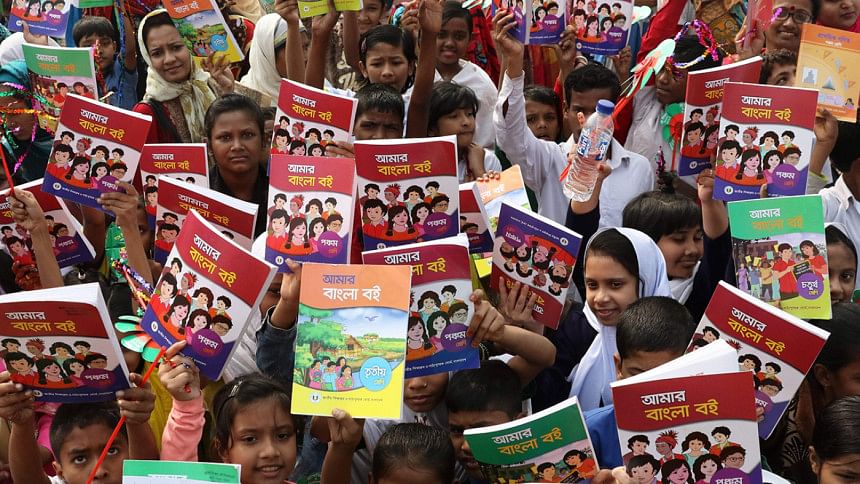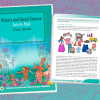Communal group behind changes

The National Curriculum and Textbook Board made changes in several school textbooks of this year under pressure from a communal group, according to a study of Transparency International Bangladesh.
Sixteen pieces were omitted from five textbooks of primary and secondary levels and they include eleven poems that were removed to meet the demand of that particular communal group, it said.
In the absence of a clear policy on formulating curriculum and manuscripts, the ideologies of communal forces as well as of the party in power come into play in the selection of topics and words of textbooks, stated the TIB report.
It also found that the process of formulating manuscripts by the NCTB and the publication and distribution of textbooks are riddled with irregularities and corruption.
Besides, a section of NCTB officials and staff are involved in malpractices. The institution is also plagued by manpower shortage and needs experts and skilled hands.
The graft watchdog yesterday launched the study, titled "National Curriculum and Textbook Board (NCTB): Challenge of good governance in formulating manuscript and publication management and way out", at a press conference at its office in the capital.
“We have seen that changes have been made in school textbooks following pressure and demand of a communal group, and many of those changes go against the spirit of the Liberation War,” said TIB Executive Director Dr Iftekharuzzaman.
Asked about the communal group, he said they never disclose the name of any institution or party in question as per their policy.
“If the authorities concerned ask for the name, we give them that,” he said, adding, “You know it all; it's not difficult to find it out.”
On the controversial changes in this year's textbooks, Iftekharuzzaman said, "The decision was taken arbitrarily. Those who raised the demands and those who met the demands -- both wielded and misused power. Otherwise, such changes would not have been possible, especially when the national spirit and constitutional issues are involved.
"Those who are responsible for the decision should be held accountable."
The government has faced widespread criticism from various quarters over some embarrassing blunders in textbooks since the distribution of some 36.21 crore textbooks to 4.26 crore students at primary and secondary levels on January 1.
Eminent citizens and various organisations condemned the anomalies and demanded withdrawal of the books.
“The deliberate changes in the textbooks were the result of regression and fundamentalism,” read a statement issued by eighty-five eminent citizens in January.
“There is a dangerous spread of communal politics behind this, which has been evident over the last few years. This year's textbook is the manifestation of compromise of the government with the communal politics.”
Faced with criticism, the government made two NCTB officials OSD, suspended one and transferred seven other officials for the errors in the textbooks.
AUTONOMY COMPROMISED
Formed and run under an ordinance of 1983, the NCTB is supposed to be autonomous, but the political party in power exercises an influence over it.
Conducted between October 2016 and October this year, the study said topics and words in textbooks change with the change of government.
Therefore, whenever the government forms committees, preferences are given to people loyal to the ruling party while selecting members. In some cases, competent persons get excluded because of political consideration.
Favouritism works also in the formation of textbook writers' panel. Even incompetent people, who do not have a clear idea about the curriculum, are sometimes picked as members.
Due to the political influence over the institution and failure in ensuring its autonomy, “we are losing the opportunity to build a merit-based society and also getting derailed from the spirit of the Liberation War”, said Iftekharuzzaman.
The graft watchdog suggested amending the ordinance of 1983 and preparing rules of the ordinance.
"As per the ordinance, the NCTB was supposed to be an autonomous institution. Every autonomous body works under a ministry but it has to have autonomy. But this institution never got that status," said the TIB boss.
The study said distortions of original poems, spelling mistakes and incoherent topics and photos are the key challenges in editing textbooks.
The absence of proper planning and system for textbook manuscript preservation and nepotism in the recruitment of proof-readers were some other problems that are needed to be fixed, it said.
IRREGULARITIES IN PUBLICATION, DISTRIBUTION
The study found irregularities and corruption at 16 out 20 stages of formulation of manuscripts, and publication and distribution of textbooks.
The officials and staff of distribution wing of the NCTB get honorarium for work related to production and distribution though there is no official order to that end.
Around Tk 27.60 lakh was spent this year as the honorarium for the tasks like making guidelines for tender, publishing advertisement, issuing work order and preparing a list of books sent to the upazilas as per the work order.
Over Tk 50.96 lakh was spent in the last three years for this purpose.
Replying to a query, Morsheda Akhter, deputy programme manager of TIB's research and policy wing, said that the officials and employees, from chairman to MLSS, receive such honorarium though they get six bonuses every year.
The study also said a section of NCTB officials inform some specific organisations about the projected estimate before inviting tender. Therefore, the organisations submit tender after discussing among themselves and reaching an understanding.
The board also in exchange of money gives work order to paper mills that do not have BSTI certificates.
Every year, it also awards the work to paper suppliers who were black-listed for failing to supply quality papers.
In some cases, the monitoring institution gives satisfactory report in favour of some publishing houses in exchange of money.
RECOMMENDATIONS
TIB came up with 16-point recommendation including turning the NCTB into an independent commission. Prior to forming the commission, it said, a committee comprising experts will have to be formed.
"We demand that the NCTB and government consider our recommendations and take the responsibility of reforming the institution," Iftekharuzzaman said.
TIB also suggested curbing the influence and control of education ministry, appointing subject-wise experts and skilled people for writing books and introducing agreement with writers and editors about responsibilities and honorarium.
Prof Dr Sumaiya Khair, adviser, executive management of TIB, and Mohammad Rafiqul Hasan, director of research and policy wing, were also present.

 For all latest news, follow The Daily Star's Google News channel.
For all latest news, follow The Daily Star's Google News channel. 








Comments